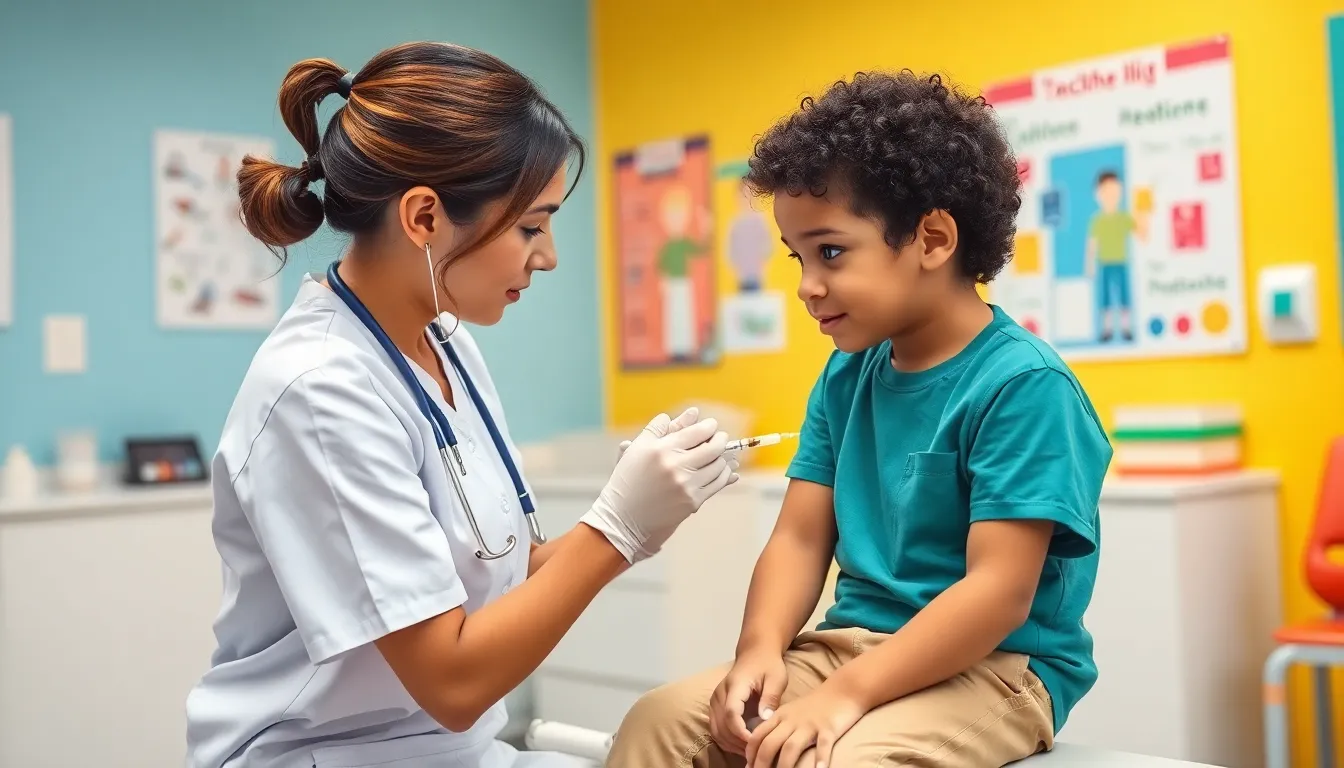When it comes to kids’ health, parents often feel like they’re navigating a jungle filled with tiny tantrums and mysterious fevers. Enter the pediatrician, the superhero in scrubs who specializes in keeping little ones happy and healthy. With a stethoscope in one hand and a lollipop in the other, these doctors tackle everything from sniffles to growth spurts, ensuring that childhood is a time for fun, not fear.
Pediatricians don’t just treat illnesses; they’re the trusted allies in a parent’s quest for answers. Whether it’s a late-night call about a strange rash or a routine check-up that turns into a giggle fest, these experts know how to make kids feel at ease. So, if you’re looking for someone who can turn a doctor’s visit into an adventure, look no further than the wonderful world of pediatrics.
Table of Contents
ToggleWhat Is a Pediatrics Doctor?
A pediatrics doctor, or pediatrician, focuses on the medical care of infants, children, and adolescents. These specialists prioritize the health and development of young patients, addressing various medical needs from birth through late teenage years.
Definition and Role
Pediatricians diagnose and treat a wide range of illnesses and health issues in children. They monitor developmental milestones, provide immunizations, and manage chronic conditions like asthma or diabetes. These doctors also offer guidance to parents on nutrition, safety, and emotional health. Pediatricians establish trusting relationships with their young patients, making healthcare experiences less daunting.
Areas of Specialization
Pediatricians can specialize in various fields, enhancing their expertise. Some focus on pediatric cardiology, addressing heart-related conditions in children. Others may pursue pediatric endocrinology, focusing on hormonal disorders. Pediatricians also specialize in areas such as neonatology, addressing care for newborns, and developmental-behavioral pediatrics, which works with developmental delays and behavioral challenges. Each specialty ensures children receive tailored care for their unique needs.
Education and Training Requirements

Pediatricians undergo extensive education and training to provide comprehensive care for children. Their journey typically includes several key stages.
Medical School
Medical school generally requires four years of rigorous education. During the first two years, students focus on foundational sciences such as anatomy, physiology, and pharmacology. The final two years often involve clinical rotations, where they gain practical experience across various specialties, including pediatrics. Students often participate in hands-on learning, honing their skills in patient interaction and diagnosis. Graduating from medical school leads to earning a Doctor of Medicine (MD) or a Doctor of Osteopathic Medicine (DO) degree.
Residency and Fellowship
After medical school, aspiring pediatricians enter a residency program, which lasts three years. They receive specialized training during this time, covering essential areas such as child development, childhood diseases, and family dynamics. Residents engage in supervised clinical practice, working closely with experienced pediatricians. Some choose to pursue additional fellowship training, which typically lasts one to three years, focusing on specialized fields such as pediatric cardiology or neonatology. Completing fellowship training equips pediatricians with advanced skills necessary for providing expert care in their chosen area.
Importance of Regular Pediatric Visits
Regular pediatric visits play a crucial role in maintaining children’s health. These appointments help identify potential health issues early while promoting overall well-being.
Preventative Care
Preventative care remains essential for children’s long-term health. Pediatricians administer vaccinations according to established schedules, protecting children from serious diseases. They also provide guidance on nutrition and exercise, helping families develop healthy habits. Regular check-ups allow healthcare professionals to monitor growth patterns and address concerns proactively. These visits offer opportunities for parents to ask questions about preventative measures, ensuring informed decision-making for their children’s health.
Monitoring Developmental Milestones
Monitoring developmental milestones is another critical aspect of pediatric visits. Pediatricians assess physical, emotional, and social development during each check-up. They use standardized tools to evaluate milestones and identify any areas needing attention. Parents receive valuable insights into their child’s development, including expectations for growth and behavior at various ages. Pediatricians provide tailored advice to support each child’s unique needs, ensuring timely interventions and resources when necessary. Tracking progress over time fosters a supportive environment for children as they grow and thrive.
Common Conditions Treated by Pediatrics Doctors
Pediatricians address numerous health issues affecting children, ensuring proper diagnosis and management of various conditions.
Allergies
Allergies are common in children, impacting their daily activities and quality of life. Symptoms range from mild to severe, including sneezing, itching, and hives. Pediatricians conduct skin tests or blood tests to diagnose allergies accurately. Treatment typically involves avoidance of allergens and may include antihistamines or nasal sprays. Pediatricians educate parents on recognizing allergy triggers, helping create safer environments for their children. Proper management frequently leads to improvement in children’s overall health and wellbeing.
Asthma
Asthma is a chronic condition characterized by inflammation in the airways. Symptoms often include wheezing, coughing, and shortness of breath, especially during physical activity. Pediatricians play a key role in diagnosing asthma through physical examinations and lung function tests. They develop personalized management plans, which may include inhalers, medication, and lifestyle adjustments. Regular check-ups help monitor asthma control and adjust treatment as needed. Comprehensive asthma care from pediatricians can significantly enhance children’s quality of life, reducing the frequency of attacks and hospital visits.
Choosing the Right Pediatrics Doctor
Selecting the appropriate pediatrics doctor is essential for ensuring children’s health. Parents should evaluate several factors before making a decision.
Factors to Consider
Experience matters when choosing a pediatrician. Look for doctors who have training in child-specific medicine and expertise in treating various childhood illnesses. Accessibility plays a significant role; consider office hours and location for convenience. Communication style is another crucial aspect; pediatricians should be approachable and willing to answer questions clearly. Additionally, check for board certification to ensure the pediatrician meets national standards for training and knowledge. Parents can also seek recommendations from friends or family to gather insights about potential pediatricians.
Questions to Ask
Inquire about the pediatrician’s experience with specific health conditions. Ask how they handle emergencies during office hours and after hours. Discuss vaccination policies and what schedules they recommend. Parents should also question the approach to developmental assessments and how frequently these evaluations occur. Availability for consultations and how they communicate with parents are other important factors. Understanding how the pediatrician addresses concerns about nutrition or emotional health can provide additional clarity regarding their approach to comprehensive care.
Conclusion
Pediatricians play an indispensable role in nurturing children’s health and development. Their expertise not only addresses medical concerns but also fosters a supportive environment for both kids and parents. By prioritizing preventative care and regular check-ups, pediatricians help identify health issues early, ensuring children thrive.
Choosing the right pediatrician is crucial for long-term health. Parents should consider experience, communication style, and accessibility when making this important decision. With the right pediatrician by their side, families can navigate the complexities of childhood health with confidence and peace of mind.




